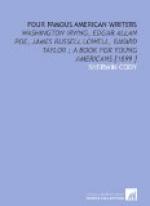CHAPTER XII
MUSIC AND POETRY
Poe always maintained that music and poetry are very near of kin, and in nearly all his greatest poems he seems to write in such a way as to produce the impression of music. As you read his verses you seem to hear a musical accompaniment to the words, which runs through the very sounds of the words themselves.
Poe explained that poetry and music are alike in that both obey absolute laws of time, and that the laws of time or rhythm in poetry are just as exact as the laws of time in music. He wrote an essay entitled “The Rationale of Verse,” in which he demonstrated that all the rules for scanning poetry are defective. Every one knows that the ordinary rules for meter have numerous exceptions, but that if the rules were exact in the first place, there would be no exceptions.
Perhaps you know something about musical notes. If so, a simple illustration will show you what “feet” in poetry are. You have perhaps been taught that a “foot” in verse is an accented syllable with one or more unaccented syllables, and you scan poetry by marking all the accented syllables. In Latin, poetry was scanned by marking long vowels and short. Let us scan the first two lines of “The Raven”:
“Once up | on a midnight | dreary, || while I | pondered | weak and | weary, Over | many a | quaint and | curious | volume | of for | gotten | lore.”
Observe that most of the feet have two syllables each, while two have three. But if you read the lines in a natural tone you will see that you give just as much time to one foot as to another, and where there are three syllables they are short and can be pronounced quickly. Some syllables take more time to pronounce than other syllables; and to accent a syllable simply means to give it more time in pronouncing. In music, time is accurately represented by notes, and a bar of music always contains exactly the same amount of time, no matter how it is divided by the notes; for if you wish, in place of a half note you can use two quarter notes, or in place of a quarter note you can use two eighth notes. Represented in music, our lines will be as follows:
[Illustration: (music) Once up on a midnight dreary, as I pondered, weak and weary, O-ver man-y a quaint and cur-i—ous vol-ume of for-got-ten lore.]
We see this still further illustrated in a poem of Tennyson’s, where a foot consists of but one long syllable, thus:
[Illustration: (music) Break, break, break, On thy cold grey stones, O sea!]
One of Poe’s greatest poems, “The Bells,” was written for the express purpose of imitating music in verse. The story of how it was first written is as follows:
Poe went one Sunday morning to call on a lady friend of his, Mrs. Shaw, who was something of a physician and had been very kind to his wife. It was a bright morning, and the church bells were ringing. For all that, Poe felt moody, and the church bells seemed to jangle.




